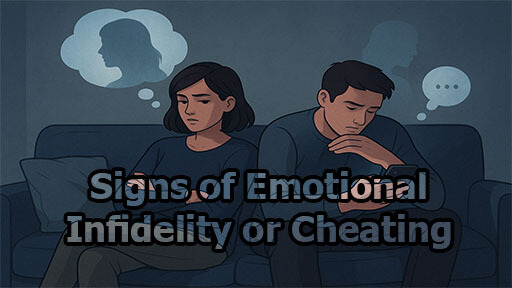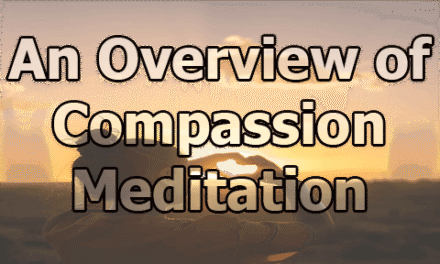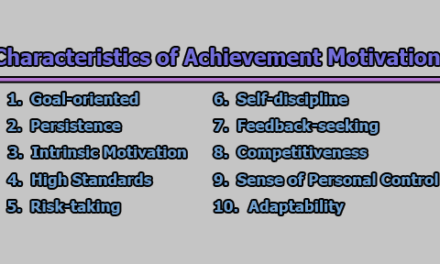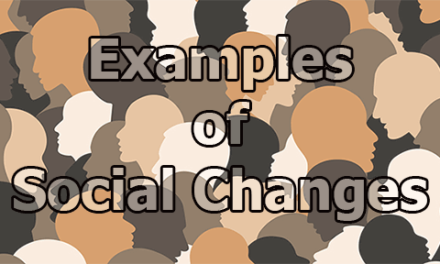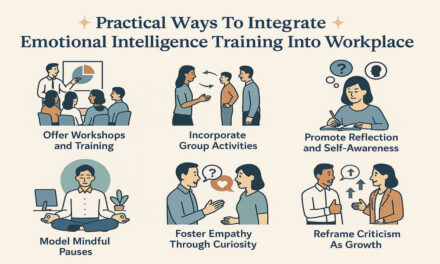Signs of Emotional Infidelity or Cheating:
When people think about cheating, their minds often jump straight to physical intimacy. But not all forms of betrayal involve sex. Emotional infidelity can be just as painful, sometimes even more so, because it quietly undermines the foundation of trust and closeness in a relationship. It happens when one partner begins to share their most personal thoughts, feelings, and vulnerabilities with someone outside the relationship in a way that crosses the line of friendship. The difficulty lies in recognizing when a bond with someone else shifts from innocent to inappropriate. In this article, we’ll break down the key signs of emotional infidelity or cheating, how it can affect your relationship, and what steps you can take if you find yourself or your partner caught in an emotional affair.
Signs of Emotional Infidelity or Cheating:
Recognizing emotional infidelity is not always simple, because the boundary between a close friendship and something more can be blurry. However, there are consistent patterns and behaviors that suggest when the connection with another person may have crossed the line. Emotional cheating is not necessarily about physical intimacy — it’s about secrecy, misplaced emotional investment, and the erosion of intimacy in the primary relationship. Below are some of the most common signs:
- Hiding the relationship from your partner: If you find yourself avoiding conversations about this person with your partner or intentionally downplaying your interactions, that secrecy itself is a warning sign. Healthy friendships usually don’t need to be hidden.
- Deleting or hiding conversations: Regularly deleting texts, messages, or call logs to cover up the level of communication you have with someone else is a strong indicator of emotional infidelity. The act of concealment suggests you already recognize your partner might not approve.
- Keeping the nature of the relationship secret: Not being open about the frequency or depth of your conversations is another red flag. If you feel the need to filter what you tell your partner about this person, it could mean the relationship has crossed into territory you’re not comfortable acknowledging.
- Not mentioning your partner: When talking to the other person, do you leave out the fact that you’re in a committed relationship? This omission can signal an intentional blurring of boundaries and creates the illusion that you’re available.
- Flirting: Playful teasing, suggestive comments, or even subtle romantic undertones in conversation may seem harmless, but over time they create intimacy that competes with your main relationship.
- Fantasizing about the other person: If you catch yourself daydreaming about the other person romantically or sexually, the bond is no longer a simple friendship. Mental and emotional energy that should be directed toward your partner is being redirected elsewhere.
- Developing romantic or sexual feelings: Even if these feelings aren’t acted upon, allowing them to deepen is a hallmark of emotional infidelity. The emotional connection you share with this person could threaten the intimacy with your partner.
- Feeling guilty about interactions: That inner sense of guilt after talking to or spending time with the other person is often your conscience signaling that your behavior is misaligned with your commitment.
- Talking badly about your partner: Confiding negative thoughts about your relationship or sharing private struggles that your partner would not want disclosed can be damaging. It builds intimacy with the other person at the expense of trust in your relationship.
- Seeking emotional support elsewhere: When you start turning to this person for comfort, validation, or emotional support instead of your partner, it can weaken the bond with your significant other.
- Investing significant time: Whether it’s late-night conversations, constant texting, or making time to meet, consistently prioritizing this person over your partner can erode the closeness in your relationship.
- Losing interest in your partner: If your connection with the other person leaves you less interested in spending time with your partner, it may indicate that your emotional energy is being redirected toward someone else.
Am I Having an Emotional Affair?
It is completely normal to find other people attractive, even when you are happily committed. What matters is how you handle those feelings. The key difference between a harmless attraction and emotional cheating is whether your actions begin to take away from the trust, intimacy, and attention in your primary relationship. To evaluate honestly, ask yourself:
- Am I open with my partner about this friendship and its nature, or do I hide it? If I am hiding it, what does that say?
- Do I feel romantic or sexual attraction toward this person?
- Do I prefer sharing my private thoughts and feelings with them rather than with my partner?
- Do I compare my partner and my relationship to this new connection?
- Has my partner expressed discomfort about this person, and is their concern valid?
- Have I lost interest in my partner because of my bond with the other person?
If the answer to several of these questions is yes, you may already be moving beyond friendship into emotional infidelity.
Is My Partner Having an Emotional Affair?
Just as you can question your own boundaries, you may also wonder whether your partner is engaged in an emotional affair. Unlike physical infidelity, the signs can be subtle, and suspicion alone doesn’t mean guilt. Still, if you notice the following, it may be worth having an honest conversation:
- Do they seem more distant or emotionally unavailable since meeting this person?
- Have you noticed behavioral changes, like staying up later, being more secretive, or showing increased irritability?
- Do they hide their phone, change passwords, or act defensive about their messages?
- Have they minimized or lied about the time they spend with this individual?
- Does your intuition tell you something isn’t right, even if you can’t prove it?
- When you bring up your concerns, how do they respond? Do you feel reassured, or do you sense deflection and avoidance?
While these signs don’t prove infidelity, they do highlight a potential shift in priorities and intimacy that should not be ignored. Trust, openness, and honest communication are essential to address concerns before they damage the relationship further.
How Emotional Infidelity Impacts Relationships:
Many people assume that sexual infidelity is more harmful than emotional infidelity. In reality, any form of betrayal can be profoundly damaging to a relationship. Emotional infidelity can evoke feelings of rejection, emotional abandonment, betrayal, and distress, often just as intensely as physical cheating.
When someone engages in an emotional affair, they form a close, intimate bond with another person while keeping it secret from their partner. This “hidden ‘us’” can feel like a deep betrayal to the partner who is being kept in the dark. The partner may experience a range of painful emotions, including feelings of being replaced, rejected, humiliated, and profoundly hurt. At the same time, the intimate connection and trust that were once the foundation of the relationship are placed at risk, potentially leading to long-term consequences if unaddressed.
Key Impacts of Emotional Infidelity:
- Erodes trust: Trust is the cornerstone of any healthy relationship. Emotional infidelity damages this trust, making the relationship feel unsafe and opaque. Partners may begin to doubt each other’s intentions and honesty, which can be difficult to repair.
- Creates emotional distance: Time, energy, and attention that should be devoted to the primary relationship are redirected toward the person outside the relationship. This shift creates a sense of emotional distance, leaving the partner feeling disconnected, unsupported, and isolated.
- Generates negative feelings: Emotional infidelity often triggers a cascade of negative emotions such as jealousy, resentment, hurt, and insecurity. These feelings can accumulate over time, eroding the overall health of the relationship.
- Increases the risk of breakup: When emotional intimacy is siphoned away, the commitment between partners weakens. If the issue remains unresolved, the relationship may deteriorate, and in some cases, couples may separate.
- Damages wellbeing: Emotional infidelity affects not only the relationship but also the psychological health of both partners. The cheated-on partner may experience depression, anxiety, and low self-esteem. Meanwhile, the unfaithful partner may grapple with feelings of guilt, remorse, and shame (Rokach & Chan, 2023).
Why Emotional Infidelity Hurts (An Evolutionary Perspective): Evolutionary psychology offers insight into why emotional infidelity is particularly painful. Jealousy, as Symons (1979) explains, evolved to protect valuable social relationships. It functions as a mechanism to safeguard critical relational resources such as love, attention, time, and long-term commitment. Emotional betrayal directly threatens these resources, naturally leading to feelings of jealousy, hurt, and emotional distress.
For women, emotional infidelity may be particularly threatening. Historically, losing a partner’s emotional investment could mean losing critical support and resources, including protection, assistance in child-rearing, and shared life stability. In ancestral environments, such losses could have posed serious survival risks, which may explain why emotional infidelity often elicits intense emotional reactions.
Research supports this perspective. Heterosexual women typically rate emotional infidelity as more distressing than sexual infidelity, reflecting concerns about lost emotional investment and resources. In contrast, heterosexual men are generally more concerned with sexual infidelity due to issues related to paternal uncertainty (Buss, 2018).
When considering same-sex relationships, patterns differ slightly. For example, Frederick and Fales (2016) found that gay men were equally upset by emotional and sexual infidelity, while lesbian women showed a slightly higher distress toward emotional infidelity, although the difference was not statistically significant. These findings suggest that the psychological impact of emotional infidelity is influenced by both gender and relational context, but remains significant across different types of relationships.
How to Handle Emotional Cheating:
Emotional cheating can shake the foundation of any relationship, whether you suspect your partner is engaging in it or you find yourself involved in an emotional affair. Handling such a situation requires honesty, self-awareness, and careful navigation, whether you aim to work through it together or apart. Because these situations are often complex and emotionally charged, seeking professional guidance, such as a couple’s counselor or therapist, can provide valuable support and guidance.
Below are practical steps and strategies for managing emotional infidelity, both for the person who suspects it and for the person who may be participating in it.
If You Suspect Emotional Infidelity:
- Pause and reflect: Before confronting your partner, take a moment to center yourself and clarify your own feelings. Emotional responses in the heat of the moment can lead to accusations and defensiveness. By pausing, you allow yourself to approach the situation with calm, measured thoughts, which increases the likelihood of a constructive conversation.
- Reflect on the evidence: Carefully assess what you’ve noticed without jumping to conclusions. Signs may include behavioral changes, increased secrecy, more frequent contact with another person, or messages and conversations that raise concern. Separate facts from assumptions, focusing on what you genuinely know rather than what you fear might be happening.
- Communicate openly: Once you feel grounded, initiate a conversation with your partner. Approach the discussion with openness rather than accusation. Use “I” statements to express your feelings, which helps prevent defensiveness. For example:
-
- “I feel we’re growing quite distant since you’ve been spending more time with X.”
- “I’m feeling uncomfortable about your relationship with X. Is there something going on between you?”
- “Do you have feelings for them?”
Open-ended questions encourage dialogue and provide your partner the opportunity to explain themselves without feeling attacked.
- Communicate your boundaries: Even if your partner insists, “We’re just friends,” it’s important to assert your boundaries and request honesty. Clearly define what feels acceptable to you in terms of interactions with others, and express the importance of transparency in maintaining trust.
- Understand the bigger picture: Emotional affairs often arise as symptoms of underlying issues in a relationship, such as neglect, lack of intimacy, or unresolved conflict. Use this opportunity to explore the broader dynamics of your relationship, identify unmet needs, and consider whether changes are necessary to strengthen the partnership.
If You’re Engaged in an Emotional Affair:
- Acknowledge the harm: Recognize that emotional infidelity can deeply hurt your partner, even in the absence of physical intimacy. Avoid invalidating their feelings or minimizing the situation. Accept that your actions may have lasting emotional consequences and that trust has been compromised.
- Be transparent: If you want to work on the relationship, honesty is crucial. Be open about the nature of the emotional affair, why it happened, and the context in which it developed. Transparency allows your partner to understand the situation fully, which is an essential step toward rebuilding trust.
- Explore your motivations: Reflect on the reasons behind your emotional involvement with someone else. Were you seeking more intimacy or connection? Feeling resentment toward your partner? Searching for novelty or excitement? Understanding your own motivations helps you address the underlying issues and make informed decisions about your relationship.
- Take responsibility for healing the rupture: Repairing the relationship requires a commitment to rebuilding trust. Communicate your willingness to engage in open dialogue, participate in counseling, and respect your partner’s boundaries regarding contact with the other person. Taking responsibility means not only acknowledging the betrayal but also actively working to restore the emotional bond and prevent further harm.
Handling emotional infidelity, whether as the affected partner or the one involved, demands patience, empathy, and honest communication. By approaching the situation thoughtfully and taking deliberate steps to address both immediate and underlying issues, couples can navigate this difficult challenge and, in many cases, emerge with a stronger, more resilient relationship.
In conclusion, emotional infidelity is often subtle, making it difficult to recognize until it has already impacted the relationship. Signs such as secrecy, romantic feelings for someone else, and emotional withdrawal from your partner are clear indicators that boundaries have been crossed. While it may not involve physical intimacy, the effects on trust, connection, and emotional well-being can be just as profound as sexual infidelity. Addressing the situation with honesty, open communication, and, when needed, professional guidance is essential. Whether the goal is to repair the relationship or to part ways, acknowledging the issue and confronting it thoughtfully is the first step toward healing for both partners.
Frequently Asked Questions (FAQs):
What are emotional boundaries in a relationship?
Emotional boundaries are the limits within a relationship that help protect intimacy, trust, and mutual respect. They define what is appropriate to share with others, how much time and emotional energy can be devoted outside the relationship, and what is expected in terms of honesty and transparency. For example, being open with your partner about your friendships and not sharing intimate details of your relationship with someone else are ways to maintain healthy emotional boundaries. Emotional boundaries also include not taking responsibility for another person’s feelings in a way that undermines your primary relationship.
How is emotional infidelity different from a close friendship?
The key differences between emotional infidelity and a close friendship are intention and transparency. A true friendship is platonic, meaning there are no romantic or sexual feelings, and it is not hidden from your partner. Emotional infidelity occurs when romantic or sexual feelings develop, or when a friendship is deliberately kept secret or prioritized over the primary relationship. If you are sharing intimate thoughts, seeking emotional support, or forming a bond that rivals your connection with your partner, it may be crossing into cheating territory.
Can emotional infidelity happen without physical intimacy?
Yes. Emotional infidelity does not require sexual activity. It is defined by forming an intimate bond with someone outside the relationship that threatens the trust, closeness, or commitment of your primary partnership. Sharing personal secrets, seeking emotional support, or developing romantic feelings for someone else are all forms of emotional cheating, even if nothing physical occurs.
How can I tell if my partner is emotionally cheating?
Signs of emotional infidelity can include secrecy, hiding conversations, increased time spent with someone else, emotional withdrawal, and decreased interest in the relationship. Changes in behavior, such as defensiveness, irritability, or avoiding discussions about a particular person, can also be indicators. Trust your instincts but also seek clarity through calm and open communication with your partner.
What should I do if I suspect emotional infidelity?
Start by reflecting on your observations and separating facts from assumptions. Then, approach your partner with honesty and openness using “I” statements, such as: “I feel distant when you spend so much time with X. Can we talk about it?” Communicate your boundaries clearly and consider whether there are underlying issues in the relationship that need attention. Professional support, like couples counseling, can also help navigate these sensitive conversations.
What should I do if I am the one engaging in emotional infidelity?
Acknowledging the harm is the first step. Be transparent with your partner about what happened and why, take responsibility for your actions, and explore the motivations behind the emotional connection. Respect your partner’s boundaries and work together to rebuild trust. Therapy or counseling can help both partners process the betrayal and strengthen the relationship, if both choose to continue together.
Can a relationship recover from emotional infidelity?
Yes, but it requires time, commitment, and effort from both partners. Healing involves rebuilding trust, addressing unmet needs, strengthening communication, and setting clear emotional boundaries. With honesty, empathy, and often professional guidance, couples can recover and even deepen their connection after emotional infidelity.
References:
- Buss, D. M. (2018). Sexual and emotional infidelity: Evolved gender differences in jealousy prove robust and replicable. Perspectives on Psychological Science, 13(2), 155–160. https://doi.org/10.1177/1745691617698225
- Frederick, D. A., & Fales, M. R. (2016). Upset over sexual versus emotional infidelity among gay, lesbian, bisexual, and heterosexual adults. Archives of Sexual Behavior, 45(1), 175–191. https://doi.org/10.1007/s10508-014-0409-9
- Rokach, A., & Chan, S. H. (2023). Love and Infidelity: Causes and Consequences. International Journal of Environmental Research and Public Health, 20(5), 3904. https://doi.org/10.3390/ijerph20053904
- Symons, D. (1979). The evolution of human sexuality. Oxford University Press.

Library Lecturer at Nurul Amin Degree College

